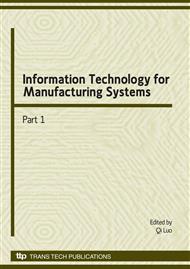[1]
A Polivka, A Filip. Satellite-Based Positioning for CBTC[C]. Proceeding of second international conference Reliability, safety and diagnostics of transport structures and means 2005, University of Pardubice, Czech Republic, 7-8 July (2005).
Google Scholar
[2]
Petr Ernest, Roman Mazl, Libor Preucil. Train Locator Using Inertial Sensors and Odometer[C]. Proceedings of IEEE Intelligent Vehicles Symposium 2004, June 14-17, 2004: 860-865.
DOI: 10.1109/ivs.2004.1336497
Google Scholar
[3]
Roman Mazl, Libor Preucil. Sensor data fusion for inertial navigation of trains in GPS-dark areas[C]. Proceeding of the IEEE Intelligent Vehicles Symposium 2003, June 2003: 345-350.
DOI: 10.1109/ivs.2003.1212934
Google Scholar
[4]
Antonella Albanese, Livio Marradi. The RUNE project: The Integrity Performances of GNSS-Based Railway User Navigation Equipment[C]. Proceedings of Joint Rail Conference 2005, Pueblo, Colorado, March 16-18, 2005: 211-218.
DOI: 10.1109/rrcon.2005.186082
Google Scholar
[5]
Yang Bo, Gao She-sheng et al. New Method for Fault Detection and Isolation in IMU/GPS Integrated Navigation System for Vehicle[J]. Systems Engineering, 2005, 23(2): 112-116.
Google Scholar
[6]
S Kiriczi, E Schnieder. Possibilities of Failure Detection and Identification (FDI) in a Train Localization System. Proceedings of the ASME/IEEE Joint Railroad Conference, 1994: 141-145.
DOI: 10.1109/rrcon.1994.289032
Google Scholar
[7]
Zhou Dong-hua, Ye Zhong-yin. Modern Fault Diagnosis and Fault-tolerant Control[M]. Beijing: Tsinghua University Press, 2000: 4-10, 46-56.
Google Scholar
[8]
Fu Xiao, Shengwei Wang, Xinhua Xu, Gaoming Ge. An isolation enhanced PCA method with expert-based multivariate decoupling for sensor FDD in air-conditioning systems [J]. Applied Thermal Engineering, Volume 29, Issue 4, March 2009: 712-72.
DOI: 10.1016/j.applthermaleng.2008.03.046
Google Scholar
[9]
Huang Xiao-bin, Niu Zheng, Niu Yu-guang et al. Behavior Analysis of Sensor Fault Detection Using PCA Approach[J]. Chinese Journal of Sensors and Actuators, 2003, 4: 419-423.
Google Scholar
[10]
Qiu Tian, Ding Yan-jun, Wu Zhan-song. Sensor fault detection statistics based on principal component analysis[J]. Journal of Tsinghua University (Sci & Tech), 2006, 46(8): 1447-1450.
Google Scholar
[11]
Wang Hai-qing, Yu Shi-ming. Selection of Number of Principal Conponents based on Fault Diagnosis Performance Optimization[J]. Journal of Chemical Industry and Engineering, 2004, 55(2): 214-219.
Google Scholar


